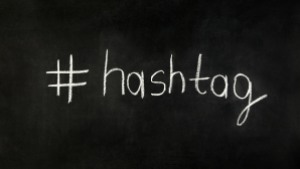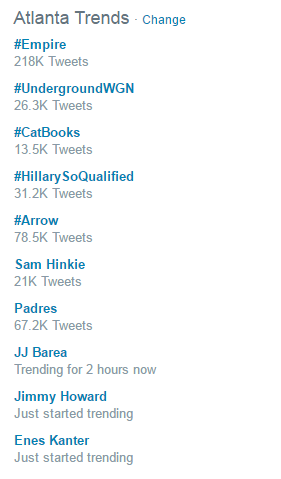We live in a community where the vast majority are connected via the web or on their mobile devices. For businesses, this can provide endless opportunities for marketing online. Whether through paid ads or posting content regularly creating strategies and utilizing the features of the networks. One such feature is the use of hashtags. Hashtags are a great way to open your business to a global market. So, let’s discuss what is a hashtag and how they can be used for business.
What are hashtags?
What is a hashtag in relation to Social Media? A hashtag is a keyword, phrase, or any string of text prepended with the pound symbol.

When doing this you have now created a tag or link for your post. This allows users to track topics, conversations, recent events, related posts around this tag. Twitter formally adopted the use of hashtags in 2009 where you can see trending topics around the world or you can isolate to your city or a specific area. Hashtags date back to 1988 when hashtags were used to categorize like items in groups so users could easily search for relevant content.
Understanding Hashtags
Let’s begin by clarifying what hashtags actually are. A hashtag is a keyword, phrase, or string of text preceded by the pound symbol (#). By adding a hashtag to your social media post, you create a tag or link that allows users to track topics, conversations, and related posts associated with that particular hashtag. While hashtags gained widespread recognition with Twitter’s adoption in 2009, their roots can be traced back to 1988 when they were used to categorize content for easier searchability.
Why should I use hashtags?
Forbes wrote on this topic in Aug 2015 and here are their reasons why you should use hashtags:
- Hashtags are universal. Anyone on the social network can view it, click it, and explore it.
- Hashtags create engagement. Anyone who clicks a hashtag trail can see your hashtag, your profile, and you. Your influence extends outside the boundaries of your own followers.
- Tweets with hashtags get two times more clicks, retweets, favorites, and replies than tweets without hashtags.
- Hashtags are an opportunity. In spite of their proven ability to attract greater engagement, only The Benefits of Using Hashtags Hashtags offer numerous benefits for businesses striving to enhance their online marketing efforts. Here are some reasons why you should incorporate hashtags into your social media strategy:
- Universal Appeal: Hashtags are universally recognized across social media platforms. Anyone browsing the platform can view, click, and explore hashtags, enabling your content to reach a wider audience beyond your immediate followers.
- Increased Engagement: Clicking on a hashtag leads users to a trail of related posts, allowing them to discover your content and engage with your brand. Tweets with hashtags have been found to receive higher click-through rates, retweets, favorites, and replies compared to tweets without hashtags.
- Amplified Reach: By using relevant and popular hashtags, your content can extend its reach beyond your immediate follower base. This increased exposure can attract new followers, potential customers, and industry influencers.
- 24% of all tweets contain hashtags.
Link: How To Harness The Power Of The Hashtag As An Entrepreneur
Hashtags are mostly used on Twitter, Google+ and Instagram. You can also use them on Pinterest, Facebook, and Youtube, however, you may not get the same results. So using them appropriately on each platform is important. The power of the hashtag is real and in my experience of effectively using this strategy, I am getting views from all over the world. It kind of blew my mind for a minute and it let me know I am well on my way to converting my viewers.
Using relevant tags according to your campaign is also important. If you are seeking a certain audience then use the tags a potential customer or someone seeking information you provide would use. This will come from your keyword research.
Choosing the Right Hashtags for Your Campaigns
To effectively leverage hashtags, it’s crucial to select the right ones for your marketing campaigns. Consider the following tips:
Relevant and Specific:
Choose hashtags that are relevant to your campaign and target audience. Conduct keyword research to understand the terms and phrases potential customers would use to find your products or services.
- Platform-Specific Strategies: Each social media platform has its own hashtag usage patterns. While hashtags are widely used on Twitter, Google+, and Instagram, their impact may vary on platforms like Pinterest and Facebook. Tailor your hashtag usage to align with the platform’s best practices.
- Quantity and Quality: Strike a balance between the number of hashtags you use and their relevance. Twitter posts with 1 or 2 hashtags have shown higher engagement rates, while Instagram posts with 11 or more hashtags tend to increase interactions. Facebook, on the other hand, performs better without hashtags.
Here are some quick notes on a few popular platforms:
Twitter: Posts with 1 or 2 hashtags has a 21% higher engagement rate than those with 3 or more
Instagram: Posts with 11 or more hashtags increase chances of interactions.
Facebook: Facebook posts without hashtags actually outperform those with hashtags
Pinterest: Pinterest currently does not utilize hashtags.
Researching Hashtags for Your Marketing Campaigns
To discover the best hashtags for your marketing endeavors, utilize the following research methods:
“How do I research hashtags?”
Below are several ways to do research. Keeping a record of the best hashtags to use for your marketing is recommended to stay on track.
This site is good for tracking how keywords are used globally and track related topics. Enter a keyword and see how it is used over time and which countries are using the keyword.
Google Adwords is a tool for a user to have their sites at the top of search engines list by creating paid advertisements. You can also use this site to research keywords and their use over time. You will have to create an account, which is free and fill out information to begin your first ad. Once approved you can stop the ad and use the interface to do your research.
Use Tophashtags.com to research the number of times a hashtag is used up to present day. You can view stats on Twitter, Facebook, Instagram, and Tumblr. You can also view the top hashtags used for these sites.
Social Media
You can also research hashtags right on your social media account. Use Twitter, for example, you can search how hashtags are used in the search bar or check for trends right in your city. You can research how other accounts are using the hashtags as well.

By incorporating relevant and well-researched hashtags into your online marketing strategy, you can significantly expand your organic reach, engage with your target audience, and drive business success. Hashtags have the potential to amplify your brand’s visibility and contribute to its growth. Embrace the power of hashtags and witness the transformative impact they can have on your online marketing efforts.
Hashtags have become a valuable tool for businesses worldwide, allowing them to connect with their audience, increase engagement, and boost their online presence. When used strategically and in line with platform-specific practices, hashtags can become a driving force behind your marketing success. Embrace the power of hashtags and unlock the full potential of your online marketing endeavors.


